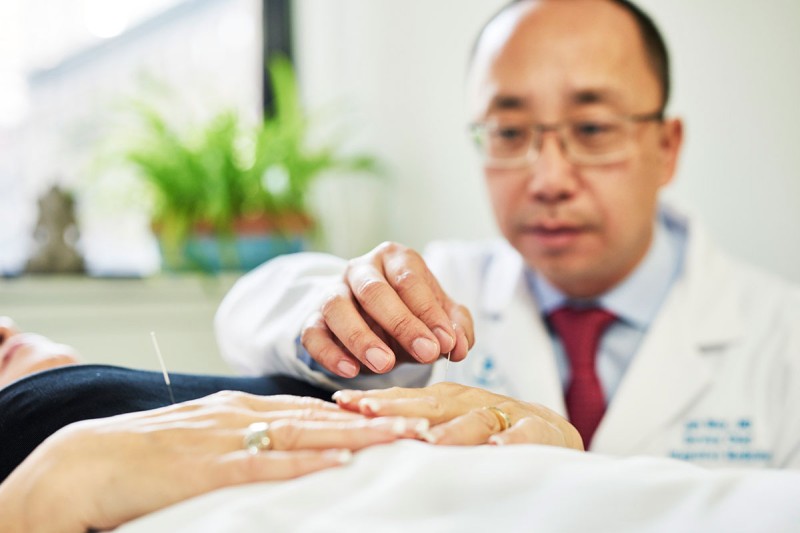
Memorial Sloan Kettering specialists are conducting clinical research looking at the benefits of acupuncture for relieving pain.
Whether someone with cancer is in the hospital, at home, or in a long-term care facility, effective pain management is an essential part of comprehensive cancer care.
Hospital stays are usually short. Pain related to cancer is most often managed after people return home. For some cancer survivors, pain management may not be necessary until after their primary treatment is done. The doctors on MSK’s Supportive Care Service provide expert pain management to people who have pain resulting from cancer and some cancer-killing therapies. Nonphysical stressors may also contribute to pain. These can include financial, emotional, and spiritual difficulties. They too are considered as part of a pain management plan.
For these and other reasons, it can be vital to maintain ongoing relationships with doctors and nurses who have specialized experience in managing cancer-related pain.
Management of Chronic Cancer Pain
Pain-relieving medicines can be prescribed to treat the various types of pain that might occur after leaving the hospital. Depending on an individual’s needs and preferences, medications can be taken several ways:
- swallowing
- holding medication in the mouth briefly until it is absorbed
- inserting medication into the rectum
- a needle into a vein
- injecting medication just under the skin
- absorption through the skin
- a pump into the space around the spinal cord
MSK anesthesiologists who have expertise in pain management can perform other interventions if needed. This might include doing a nerve block procedure or inserting a patient-controlled analgesia (PCA) pump that delivers precisely targeted doses of medicine through the skin or into the area around the spinal cord. These computerized pumps can be refilled and the medications adjusted during regular outpatient visits.
Supportive Care Service
The Supportive Care Service provides support to those who require pain management that extends beyond a hospital stay. The program’s acute pain nurses (APNs) consult with patients, caregivers, local doctors, and community pharmacists. With support from an interdisciplinary team, APNs offer their expertise in reducing pain and controlling other symptoms experienced by patients after leaving the hospital.
Counseling Center
The Memorial Sloan Kettering Counseling Center is an outpatient facility designed for the psychological support of people with cancer and their families. We provide help for many cancer-related symptoms. These include pain, fatigue, insomnia, and distress. Often an approach that combines both counseling and medication may be most the effective. Our doctors in the Counseling Center work closely with MSK’s Supportive Care Service. Counseling for people with breast cancer is also available at the Evelyn H. Lauder Breast Center at 300 East 66th Street.
Living Beyond Cancer
People facing the challenges of cancer survivorship can access a variety of support services through the Living Beyond Cancer section of our website. This section includes information about professionally led support groups and counseling, survivorship clinics to manage the late effects of cancer and its treatment, recommendations about screening and healthy living, and specialized services to address sexual and reproductive health. We also offer a range of resources to help survivors, families, and friends better understand the complex emotional and social issues that may arise following treatment.
Complementary Therapies for Pain
Complementary approaches to supplement medical pain-control methods include relaxation techniques, meditation, movement therapies, acupuncture, and massage. These techniques can provide relief from acute pain during certain procedures, as well as relief from acute postprocedural pain and some forms of chronic pain.
Memorial Sloan Kettering’s Integrative Medicine Service offers individual therapies and group classes using these complementary approaches. Complementary therapies are available to outpatients at the Bendheim Integrative Medicine Center at 1429 First Avenue (at 74th Street). For information and to make an appointment for these fee-for-service therapies, call 646-888-0800.



